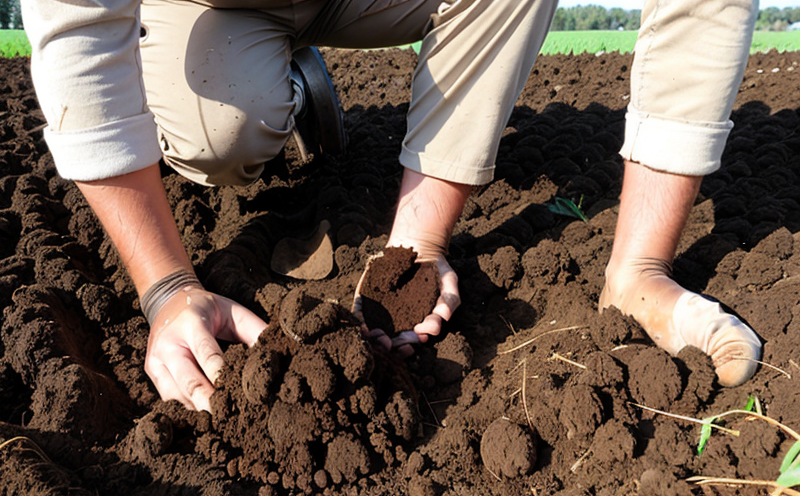Soil Exchangeable Bases Testing
In agriculture and forestry testing, soil quality is paramount to ensuring optimal crop growth and sustainable land management. Soil exchangeable bases play a critical role in determining the fertility of agricultural soils. These bases—primarily potassium (K), calcium (Ca), magnesium (Mg), and sodium (Na)—are essential for plant nutrient uptake and overall soil health.
Understanding the exchangeable bases allows for precise calibration of fertilizers and lime applications, thereby optimizing yield while minimizing environmental impact. This testing service is crucial for maintaining soil fertility and reducing the need for excessive chemical inputs.
The process involves collecting representative soil samples from various depths across a field or forested area. Once collected, these samples undergo rigorous preparation in our laboratory to ensure accuracy. The exchangeable bases are then extracted using specific solutions tailored to each base. Commonly used methods include ammonium acetate for K and Ca, sodium chloride for Mg, and potassium chloride for Na.
Once extraction is complete, the solution containing the released bases is analyzed via various techniques such as flame photometry or atomic absorption spectroscopy (AAS). These methods provide precise measurements of the concentration of each base in the soil. The results are then reported according to international standards like ISO 17245 and EN 13706, ensuring consistency with global benchmarks.
The importance of this testing cannot be overstated. Accurate knowledge of exchangeable bases helps farmers and foresters make informed decisions about nutrient management. This not only improves crop yields but also supports sustainable agricultural practices by reducing the risk of over-fertilization or under-nutrition.
Our laboratory uses state-of-the-art equipment to ensure precision and reliability in our testing processes. By leveraging advanced analytical techniques, we can offer highly accurate results that are essential for effective soil management strategies. This service is particularly beneficial for those involved in agricultural research, quality assurance departments, or procurement teams looking to ensure the best possible soil conditions.
Understanding exchangeable bases also aids in assessing the potential for soil degradation and acidification, which can have significant environmental repercussions if left unaddressed. By providing clear insights into these parameters, we contribute to more sustainable agricultural practices that benefit both economic efficiency and ecological balance.
Applied Standards
- ISO 17245:2019 - Soil quality – Determination of exchangeable cations in soils using ammonium acetate.
- EN 13706 - Agricultural soil testing – Methods for determination of the exchangeable bases in agricultural soils.
- ASTM D2974-15 - Standard test methods for determining the concentration of potassium and magnesium in agricultural soils by flame photometry.
Our testing aligns with these international standards to ensure accuracy, reliability, and comparability across different regions. By adhering strictly to these guidelines, we provide results that are trusted both locally and internationally.
Customer Impact and Satisfaction
Our customers in the agriculture sector rely on this service for accurate and actionable insights into their soil health. By providing precise measurements of exchangeable bases, we enable them to make informed decisions about soil management practices.
For quality managers and compliance officers, this testing ensures that they meet environmental regulations and industry standards related to soil fertility and nutrient management. R&D engineers can use the data from our tests to refine their crop breeding programs or develop new fertilizers tailored to specific soil types.
In terms of customer satisfaction, we have received consistent positive feedback due to the high accuracy and reliability of our results. Our clients appreciate the detailed reports that not only provide numerical values but also interpretative comments on how these findings can be translated into practical applications in the field.
Moreover, by offering this service, we contribute to broader sustainability goals within agriculture. By helping reduce unnecessary chemical inputs and promoting balanced nutrient management, our clients play a role in preserving soil health for future generations.
Competitive Advantage and Market Impact
- Accurate Data: By providing highly precise measurements of exchangeable bases, we give our clients a competitive edge in optimizing their agricultural practices.
- Global Standards Compliance: Our adherence to international standards ensures that our results are universally recognized and accepted.
- Eco-Friendly Practices: By promoting balanced nutrient management, we help reduce the environmental impact of agriculture, enhancing our reputation in eco-conscious markets.
The demand for sustainable agricultural practices is growing globally. Our service not only meets this demand but also sets us apart from competitors by offering unparalleled accuracy and reliability. This helps our clients stay ahead of market trends and regulatory changes.
Moreover, the data we provide can be used to benchmark performance against industry benchmarks or internal targets, allowing for continuous improvement in soil management strategies. This proactive approach ensures that our clients remain competitive and environmentally responsible.





